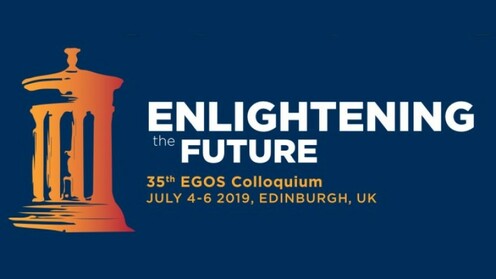|
January 2019 Dear Colleagues, This is a friendly reminder that we welcome submissions to our EGOS 2019 sub-theme on Formal Organization Today. Our goal is to bring together people interested in formal organization broadly understood. That is, empirical or theoretical papers exploring aspects of formal organization (e.g., organization structure, formalization, hierarchy, bureaucracy, etc), as well as organizational dynamics, theorized in relation to formal organization (e.g., coordination, control, socialization, learning, innovation, etc), including the link between 'informal' and 'formal' organizing. We are open to studies in any setting or industry (corporations, public sector, cooperatives, activist groups, etc). We promise a constructive and pleasant session — with homemade baked goods to boot! European Group for Organizational Studies (EGOS) 35th EGOS Colloquium, Edinburgh (UK), 4-6 July 2019 Formal Organization Today: Reconnecting with the Classics (subtheme 45) Convenors: Pedro Monteiro, emlyon business school, France, [email protected] Paul du Gay, Royal Holloway, University of London, UK, [email protected] Signe Vikkelsø, Copenhagen Business School, Denmark, [email protected] Call for Papers
Concepts and discussions on classic organizational authors currently seem to be relegated to the pages of manuals and history books (Adler, 2009). In particular, formal organizational dynamics (e.g., bureaucracy, staff-line relations, work formalization) occupy a secondary role in the current literature (du Gay & Vikkelsø, 2016). Most contemporary studies explore societal matters, work interactions, and new organizational forms, while leaving formal organizational aspects — which were once core in our discipline — in the background. In part, this state of affairs is due to the development of the field which has been enriched by new themes and approaches (Lounsbury & Beckman, 2015). Yet, we also suffer from a ‘novelty bias’ and at times do not pause to explore how new ideas fit within the canons of our discipline (Barley, 2015). The goal of this sub-theme is to stimulate an appraisal for our fundamental object of inquiry: formal organizations. In light of the theme of EGOS 2019, we believe that we can “enlighten the future” by (re)connecting with the classics (Blau & Scott, 1962; March & Simon, 1958). For example, bureaucracy is still central in the modern workplace (Adler 2012; Walton, 2005). Yet we know little about how technical and social innovations are re-shaping it, and its relationship with emerging organizational forms (Bernstein, Bunch, & Canner, 2016; Turco, 2016). Similarly, although we might be living in an age of experts, there is still much to be learned about the interplay between formal organizational mechanisms, informal/emergent dynamics and professional/knowledge work (Bechky & Chung, 2017; Brivot, 2011; Langfred & Rockmann, 2016; McEvily, Soda, & Tortoriello, 2014). Also, we know that some companies today only with a few dozen workers are able to occupy an economic position which was once reserved to corporate giants (Davis, 2016). Yet this does not mean that vertical firms — and the challenges associated with them — have disappeared. Finally, despite many changes in society, coordination and control (classic organizational themes) remain a key concern for both online and offline work (Dahlander & O'Mahony, 2014; Huising, 2014). This subtheme thus seeks to stimulate scholars to explore formal organizations both as an empirical phenomenon, as well as a source of theoretical problematics. High-quality, novel contributions in both early and later stages of development are warmly invited. In particular, papers may address issues related (but not limited) to the following topics:
Further Details EGOS is organized as a collection of workshops in which participants spend all three days of the conference in the sub-theme in which their paper has been accepted. This allows for an immersive experience with ample space for conversations. For further information about the conference, please check: https://www.egosnet.org/2019_edinburgh/CfP. For information on sub-theme 45, please check: https://bit.ly/2xdstK5. The schedule for submissions is as follows: Deadline Short papers (3,000 words) to be submitted via EGOS site: January 14, 2019 Notification of acceptance, rerouting, or rejection of papers: End of February, 2019 Full papers to be uploaded to the EGOS website: Mid-June, 2019 For further information, please contact Pedro Monteiro at [email protected] or [email protected] Comments are closed.
|

 RSS Feed
RSS Feed
